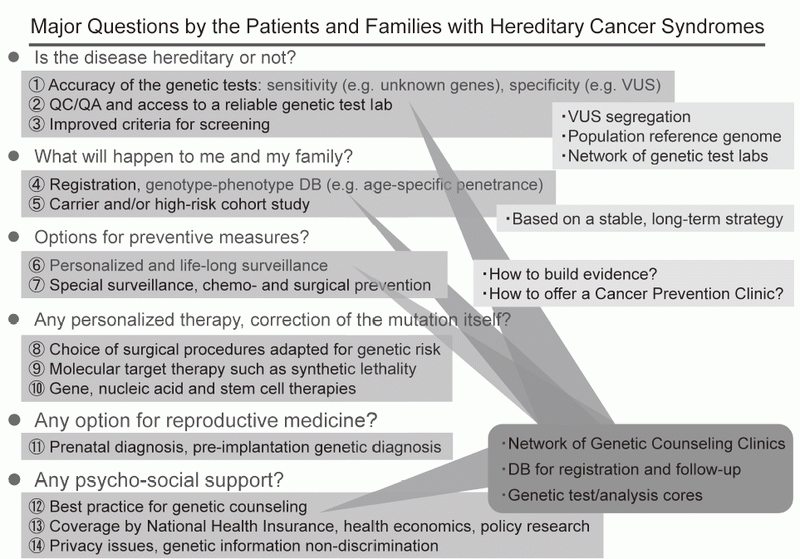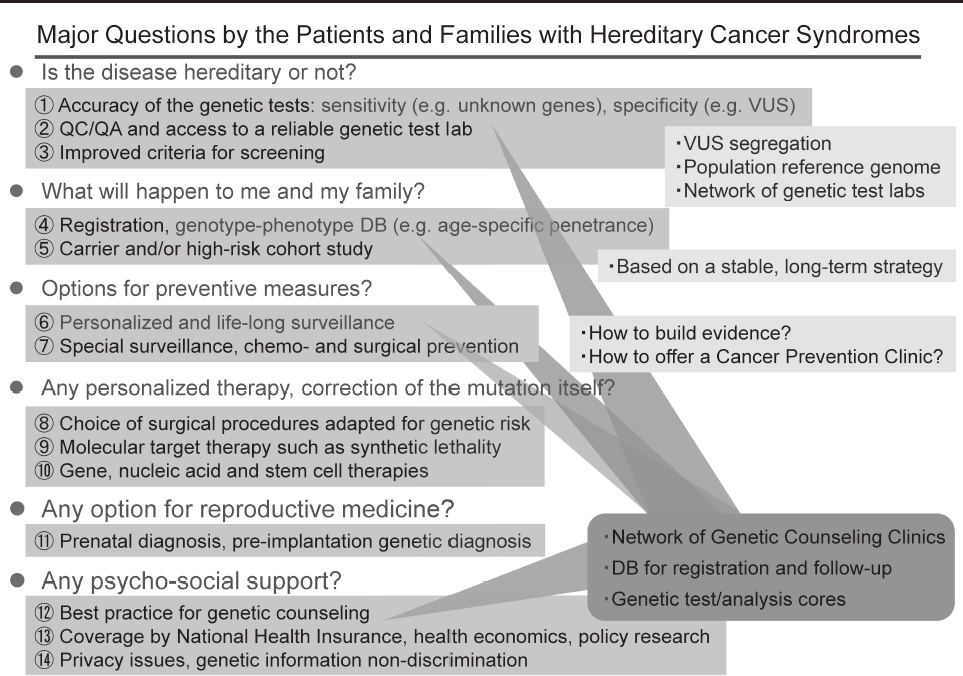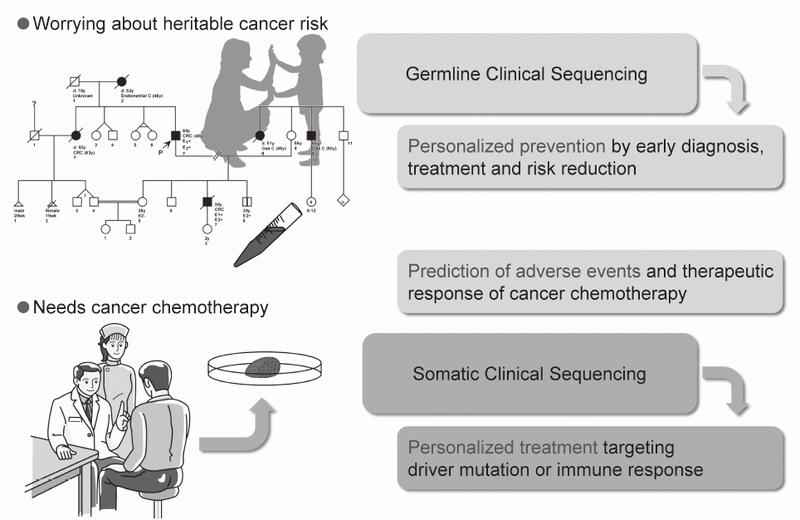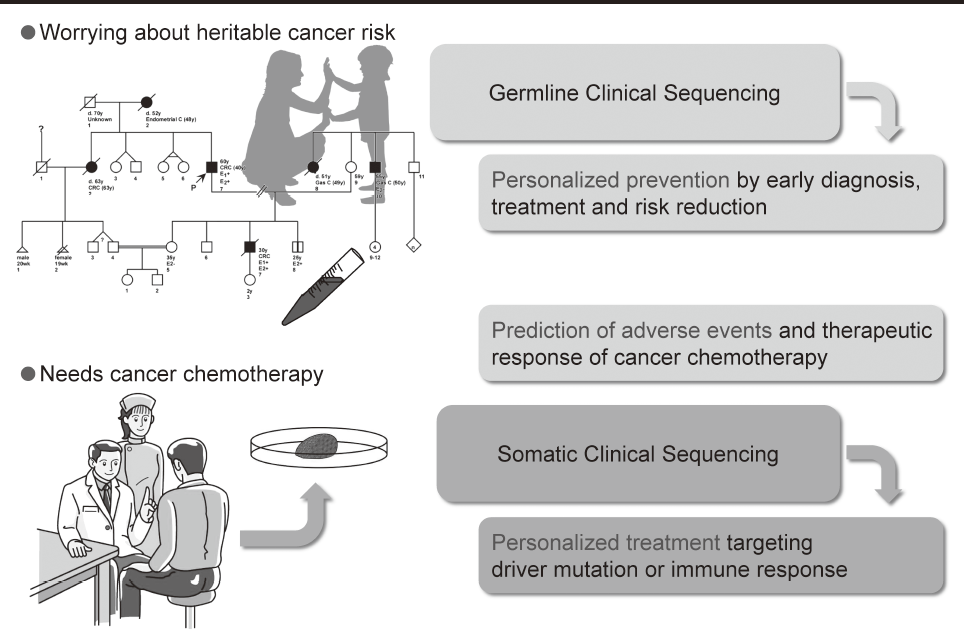Annual Report 2017
Department of Genetic Medicine and Services
Teruhiko Yoshida, Narikazu Boku, Kokichi Sugano, Shigenobu Suzuki, Takayuki Kinoshita, Chikako Shimizu, Mitsuya Ishikawa, Tadashi Kumamoto, Nobuyoshi Hiraoka, Shigeki Sekine, Taisuke Mori, Kuniko Sunami, Noboru Yamamoto, Takahisa Matsuda, Hiromi Sakamoto, Mineko Ushiama, Takashi Kohno, Mamoru Kato, Hitoshi Ichikawa, Sadakatsu Ikeda, Noriko Tanabe, Mizuki Takatsu
Introduction
It has been estimated that roughly 5% of all cancer cases are caused by a highly penetrant monogenic mutation. Major causative genes for most hereditary cancer syndromes were identified in the 1990s, and since then, genetic diagnosis has been considered as a part of standard medical care in oncology clinics. The National Cancer Center Hospital (NCCH) launched the Outpatient Genetic Counseling Clinic in 1998 as a part of collaboration with the NCC Research Institute (NCCRI), especially the Fundamental Innovative Oncology Core (FIOC). However, cancer medical genetics still has a number of issues to be addressed as shown in Figure 1.
Figure 1. Major Questions by the Patients and Families with Hereditary Cancer Syndromes

Our team and what we do
The Department of Genetic Medicine and Services (GeMS) consists of 17 doctors, five researchers, and two genetic counselors. Each staff holds the concurrent post of another department or research division, except genetic counselors.
As shown on the NCCH web site, the aim and mission of the clinical service of the Outpatient Genetic Counseling Clinic, which are the major routine clinical activities of our department, are:
1) To provide consultation and appropriate medical and genetic information (that is, genetic counseling) to anyone who has a worry related to heredity cancer
2) To provide genetic testing when appropriate
3) To support early diagnosis and treatment based on family history and/or genetic test results
4) To discuss about clinical sequencing results of patients by participating in the Expert panel
During the period from January 2017 to March 2018, 451 clients and their relatives from 343 families visited the Clinic. Of these, 211 families and 297 clients newly visited during this period. In total, 1,941 clients from 1,339 families have visited the clinic since its inception in 1998. Details are shown in Tables 1 and 2.
Research activities
Although at least one causative gene has been identified for each of the major hereditary cancer syndromes, overall sensitivity of the current genetic tests is far from 100% and may be around 70-80%, even for the cases that meet clinical and/or screening criteria for hereditary cancer syndromes. The false negative cases may include both inadequate technical sensitivity of the current genetic test methods on the established causative genes (allelic heterogeneity) and also yet-identified genes representing locus heterogeneity. There has been great expectation that the introduction of next generation sequencers (NGS) would change the situation. The staff of the Department of GeMS have established a new Common Protocol to perform NGS-based germline clinical sequencing for patients with negative test results by conventional genetic tests, who would represent a part of the Undiagnosed Disease Patients in the oncology field. The Common Protocol has been adopted by other hospitals and institutions in a long-standing multi-institute collaborative research group based on the National Cancer Center Research and Development Fund and its predecessor. In addition to whole exome sequencing (WES), a multi-gene panel has been developed based on Agilent SureSelect technology.
Table 1 Number of clients (January 2017 - March 2018)

Table 2 Number of new clients (January 2017 - March 2018)

Clinical trials
The Outpatient Genetic Counseling Clinic has participated in a prospective clinical study to optimize BRCA1/2 genetic tests and a clinical trial of a PARP inhibitor for patients with ovarian or breast cancer, and both are directed by the Department of Breast and Medical Oncology and the Department of Breast Surgery.
Moreover, we had participated in a prospective and observational clinical study to reveal BRCA1/2 pathogenic variant carrier rate in ovarian, fallopian tube, and peritoneal cancer patients.
Education
The Department of GeMS has accepted attendees for outpatient genetic counseling, so that they could be eligible to take the examination for clinical geneticists and certified genetic counselors acknowledged by the Japanese Society of Human Genetics and the Japanese Society of Genetic Counseling. In 2017, eleven doctors were registered as trainees for clinical geneticists in the education committee of clinical geneticists.
Future prospects
The Department of GeMS was launched in November 2015. Although this section reports on the routine clinical activity of our department and clinical research associated directly with the Outpatient Genetic Counseling Clinic, the scope of mission of our department extends beyond hereditary cancer syndromes and includes support of the genomic biomarker-driven personalized cancer treatment offered by other clinical departments (Figure 2). The core technology of the new discipline, also known as a precision medicine, is next-generation sequencers, which would bring massive amounts of genomic data to cancer diagnosis, treatment, and prevention. The crux of this emerging opportunity is how to convert the sequence data to clinically valid and useful knowledge, which could include incidental or secondary findings. The Department of GeMS is expected to support other departments in the era of genomic medicine.
Figure 2. Patients and Families whom GeMS Faces with

List of papers published in January 2017 - March 2018
Journal
1. Nakamura K, Komatsu M, Chiwaki F, Takeda T, Kobayashi Y, Banno K, Aoki D, Yoshida T, Sasaki H. SIM2l attenuates resistance to hypoxia and tumor growth by transcriptional suppression of HIF1A in uterine cervical squamous cell carcinoma. Sci Rep, 7:14574, 2017
2. Yamamoto Y, Nagasato M, Yoshida T, Aoki K. Recent advances in genetic modification of adenovirus vectors for cancer treatment. Cancer Sci, 108:831-837, 2017
3. Hirabayashi S, Ohki K, Nakabayashi K, Ichikawa H, Momozawa Y, Okamura K, Yaguchi A, Terada K, Saito Y, Yoshimi A, Ogata-Kawata H, Sakamoto H, Kato M, Fujimura J, Hino M, Kinoshita A, Kakuda H, Kurosawa H, Kato K, Kajiwara R, Moriwaki K, Morimoto T, Nakamura K, Noguchi Y, Osumi T, Sakashita K, Takita J, Yuza Y, Matsuda K, Yoshida T, Matsumoto K, Hata K, Kubo M, Matsubara Y, Fukushima T, Koh K, Manabe A, Ohara A, Kiyokawa N. ZNF384-related fusion genes define a subgroup of childhood B-cell precursor acute lymphoblastic leukemia with a characteristic immunotype. Haematologica, 102:118-129, 2017
4. Saito M, Ando-Tanabe N, Arita E. Factors associated with medication amounts considered excessive among university students: a questionnaire survey of pharmacy students and those in non-medical schools. BMC Health Serv Res, 17:475, 2017
5. Uraki S, Ariyasu H, Doi A, Furuta H, Nishi M, Sugano K, Inoshita N, Nakao N, Yamada S, Akamizu T. Atypical pituitary adenoma with MEN1 somatic mutation associated with abnormalities of DNA mismatch repair genes; MLH1 germline mutation and MSH6 somatic mutation. Endocr J, 64:895-906, 2017
6. Adachi M, Banno K, Masuda K, Yanokura M, Iijima M, Takeda T, Kunitomi H, Kobayashi Y, Yamagami W, Hirasawa A, Kameyama K, Sugano K, Aoki D. Carcinoma of the lower uterine segment diagnosed with Lynch syndrome based on MSH6 germline mutation: A case report. J Obstet Gynaecol Res, 43:416-420, 2017
7. Sekine S, Ogawa R, Saito S, Ushiama M, Shida D, Nakajima T, Taniguchi H, Hiraoka N, Yoshida T, Sugano K. Cytoplasmic MSH2 immunoreactivity in a patient with Lynch syndrome with an EPCAM-MSH2 fusion. Histopathology, 70:664-669, 2017
8. Nishimura T, Tamaoki M, Komatsuzaki R, Oue N, Taniguchi H, Komatsu M, Aoyagi K, Minashi K, Chiwaki F, Shinohara H, Tachimori Y, Yasui W, Muto M, Yoshida T, Sakai Y, Sasaki H. SIX1 maintains tumor basal cells via transforming growth factor-beta pathway and associates with poor prognosis in esophageal cancer. Cancer Sci, 108:216-225, 2017
9. Shiki M, Hida T, Sugano K, Kaneko R, Kamiya T, Sakurai A, Yamashita T. Muir-Torre syndrome caused by exonic deletion of MLH1 due to homologous recombination. Eur J Dermatol, 27:54-58, 2017
10. Sekine S, Mori T, Ogawa R, Tanaka M, Yoshida H, Taniguchi H, Nakajima T, Sugano K, Yoshida T, Kato M, Furukawa E, Ochiai A, Hiraoka N. Mismatch repair deficiency commonly precedes adenoma formation in Lynch Syndrome-Associated colorectal tumorigenesis. Mod Pathol, 30:1144-1151, 2017
11. Otani N, Sugano K, Inami S, Amano H, Arikawa T, Saito S, Imai K, Ushiama M, Yoshida T, Kimura N, Toyoda S, Inoue T. Cardiac paraganglioma with a novel germline mutation of succinate dehydrogenase gene D. Jpn J Clin Oncol, 47:1193-1197, 2017
12. Ono H, Sakamoto H, Yoshida T, Saeki N. Prostate stem cell antigen is expressed in normal and malignant human brain tissues. Oncol Lett, 15:3081-3084, 2018
13. Kato M, Nakamura H, Nagai M, Kubo T, Elzawahry A, Totoki Y, Tanabe Y, Furukawa E, Miyamoto J, Sakamoto H, Matsumoto S, Sunami K, Arai Y, Suzuki Y, Yoshida T, Tsuchihara K, Tamura K, Yamamoto N, Ichikawa H, Kohno T, Shibata T. A computational tool to detect DNA alterations tailored to formalin-fixed paraffin-embedded samples in cancer clinical sequencing. Genome Med, 10:44, 2018
14. Udagawa C, Nakamura H, Ohnishi H, Tamura K, Shimoi T, Yoshida M, Yoshida T, Totoki Y, Shibata T, Zembutsu H. Whole exome sequencing to identify genetic markers for trastuzumab-induced cardiotoxicity. Cancer Sci, 109:446-452, 2018
15. Tamaoki M, Komatsuzaki R, Komatsu M, Minashi K, Aoyagi K, Nishimura T, Chiwaki F, Hiroki T, Daiko H, Morishita K, Sakai Y, Seno H, Chiba T, Muto M, Yoshida T, Sasaki H. Multiple roles of single-minded 2 in esophageal squamous cell carcinoma and its clinical implications. Cancer Sci, 109:1121-1134, 2018
16. Nojima M, Iwasaki M, Kasuga Y, Yokoyama S, Onuma H, Nishimura H, Kusama R, Yoshida T, Tsugane S. Correlation between global methylation level of peripheral blood leukocytes and serum C reactive protein level modified by MTHFR polymorphism: a cross-sectional study. BMC Cancer, 18:184, 2018
17. Miguchi M, Hinoi T, Tanakaya K, Yamaguchi T, Furukawa Y, Yoshida T, Tamura K, Sugano K, Ishioka C, Matsubara N, Tomita N, Arai M, Ishikawa H, Hirata K, Saida Y, Ishida H, Sugihara K. Alcohol consumption and early-onset risk of colorectal cancer in Japanese patients with Lynch syndrome: a cross-sectional study conducted by the Japanese Society for Cancer of the Colon and Rectum. Surg Today, 48:810-814, 2018
18. Kanai Y, Nishihara H, Miyagi Y, Tsuruyama T, Taguchi K, Katoh H, Takeuchi T, Gotoh M, Kuramoto J, Arai E, Ojima H, Shibuya A, Yoshida T, Akahane T, Kasajima R, Morita KI, Inazawa J, Sasaki T, Fukayama M, Oda Y. The Japanese Society of Pathology Guidelines on the handling of pathological tissue samples for genomic research: Standard operating procedures based on empirical analyses. Pathol Int, 68:63-90, 2018
19. Sato Y, Ueno H, Ioka T, Ohkawa S, Ikeda M, Shimamura T, Tsuji A, Tsuchiya Y, Furuse J, Ishii H, Furuya K, Iguchi H, Saito Y, Kaniwa N, Sawada JI, Sakamoto H, Sekine A, Okusaka T, Yoshida T. SLCO1B1 Polymorphism Is a Drug Response Predictive Marker for Advanced Pancreatic Cancer Patients Treated With Gemcitabine, S-1, or Gemcitabine Plus S-1. Pancreas, 47:637-642, 2018
20. Tanikawa C, Kamatani Y, Toyoshima O, Sakamoto H, Ito H, Takahashi A, Momozawa Y, Hirata M, Fuse N, Takai-Igarashi T, Shimizu A, Sasaki M, Yamaji T, Sawada N, Iwasaki M, Tsugane S, Naito M, Hishida A, Wakai K, Furusyo N, Murakami Y, Nakamura Y, Imoto I, Inazawa J, Oze I, Sato N, Tanioka F, Sugimura H, Hirose H, Yoshida T, Matsuo K, Michiaki K, Matsuda K. A GWAS identifies gastric cancer susceptibility loci at 12q24.11-12 and 20q11.21. Cancer Sci, 2018
